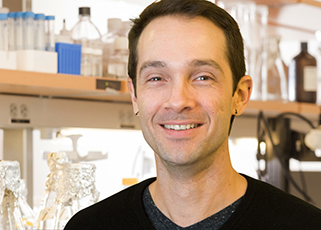The Inside Story: How the Microbiome Influences Communication Between Our Nervous and Immune Systems
TUESDAY, OCTOBER 26, 2021
4:00 – 5:00 PM ET | WEBINAR
SPEAKER

Daniel Mucida, Ph.D.
Professor
Laboratory of Mucosal Immunology
Investigator, Howard Hughes Medical Institute
HOST
Richard P. Lifton, M.D., Ph.D.
President and Carson Family Professor
Laboratory of Human Genetics and Genomics
When we think about neural processes, we focus on the brain. True, the brain is where cognition happens, but other sites in the body have important and sophisticated neural activity as well. The human digestive system, for example, houses about as many neurons as the entire spinal cord. The gut may be the most fascinating nexus of neural influence beyond the brain.
Professor Daniel Mucida investigates the delicate balance of the digestive system and its critical role in health. Maintaining that balance requires the input of commensal bacteria—the gut microbiome—as well the coordinated participation of populations of immune system cells and complex networks of neurons. His research embraces multiple fields of biomedicine, revealing unexpected cellular and molecular mechanisms that underlie the so-called gut-brain axis.
Dr. Mucida and his colleagues have traced and monitored lines of communication between microorganisms and neurons in the gut, showing that these connections are essential for regulating such functions as nutrient absorption and even feeding activity. His group’s investigations over many years have also elucidated the critical role the microbiome plays in modulating the intestinal immune system. Recently, the Mucida lab discovered that certain types of immune system cells protect intestinal neurons from damage due to inflammation.
Dr. Mucida’s research is providing insights into the origins of many gastrointestinal pathologies, including chronic inflammatory disorders, food allergies, and colon cancer. The understanding gained from this work can inform new approaches to the prevention and treatment of these and other diseases.